Former Zimbabwe president Robert Mugabe dies
"Mugabe was an icon of liberation, a pan-Africanist who dedicated his life to the emancipation and empowerment of his people," says President Emmerson Mnangagwa.
AFRICAN NEWS

Robert Mugabe, who led Zimbabwe with an iron fist from 1980 to 2017, has died aged 95, the country's president announced Friday.
First heralded as a liberator who rid the former British colony of Rhodesia of white minority rule, Mugabe used repression and fear to hold on to power in Zimbabwe until he was finally ousted by his previously loyal military generals.
"It is with the utmost sadness that I announce the passing on of Zimbabwe's founding father and former President... Robert Mugabe," Emmerson Mnangagwa said in a tweet.
"Mugabe was an icon of liberation, a pan-Africanist who dedicated his life to the emancipation and empowerment of his people. His contribution to the history of our nation and continent will never be forgotten."
Mugabe had been battling ill health, and his humiliating fall from office in November 2017, his stamina seeped away rapidly. He was hospitalised in Singapore for months for an undisclosed ailment, Mnangagwa had confirmed earlier this year.
Cde Mugabe was an icon of liberation, a pan-Africanist who dedicated his life to the emancipation and empowerment of his people. His contribution to the history of our nation and continent will never be forgotten. May his soul rest in eternal peace (2/2)
— President of Zimbabwe (@edmnangagwa) September 6, 2019
No further details were immediately available about the circumstances of his death, or where he died.
The Mugabe years are widely remembered for his crushing of political dissent, and policies that ruined the economy.
The former political prisoner turned guerrilla leader swept to power in the 1980 elections after a growing insurgency and economic sanctions forced the Rhodesian government to the negotiating table.
In office, he initially won international plaudits for his declared policy of racial reconciliation and for extending improved education and health services to the black majority.
But that faded as rapidly as he cracked down on opponents, including a campaign known as Gukurahundi that killed an estimated 20,000 dissidents.
The violent seizure of white-owned farms turned Mugabe into an international pariah -- though his status as a liberation hero still resonates strongly in most of Africa.
Aimed largely at placating angry war veterans who threatened to destabilise his rule, the land reform policy wrecked the crucial agricultural sector, caused foreign investors to flee and helped plunge the country into economic misery.
All along, the Mugabe regime was widely accused of human rights violations and of rigging elections.
The topic of his succession was virtually taboo during Mugabe's decades-long rule, and a vicious struggle to take over after his death became clear among the ruling elite as he reached his 90s and became visibly frail..
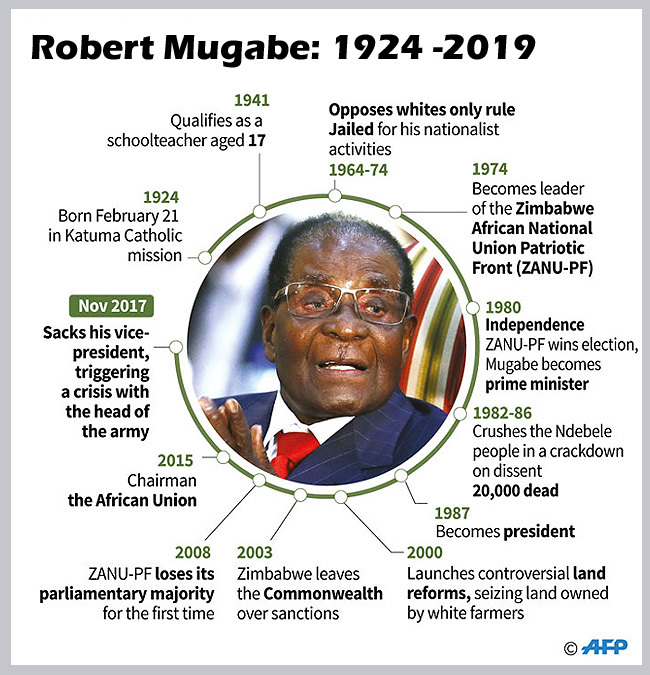
__________________________________
MUGABE: LIBERATION HERO TURNED DESPOT
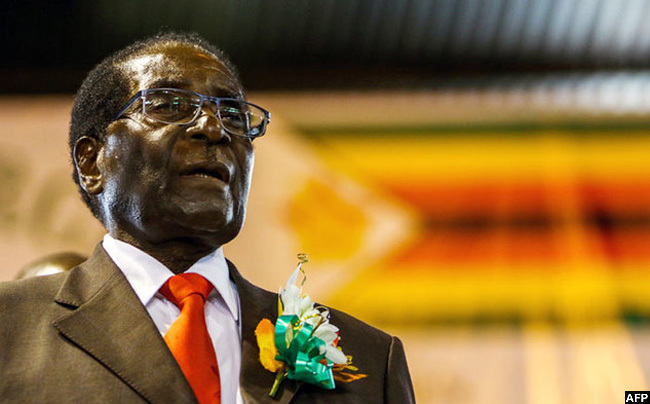
Robert Mugabe, who has died aged 95, used repression and fear to hold on to power in Zimbabwe for 37 years until he was finally ousted when his previously loyal military generals turned against him.
After his humiliating fall from office in November 2017, his phenomenal physical stamina seeped away rapidly.
First heralded as a liberator who rid the former British colony Rhodesia of white-minority rule, Robert Gabriel Mugabe will instead be remembered a despot who crushed political dissent and ruined the national economy.
The former political prisoner turned guerrilla leader swept to power in the 1980 elections after a growing insurgency and economic sanctions forced the Rhodesian government to the negotiating table.
In office, he initially won international plaudits for his declared policy of racial reconciliation and for extending improved education and health services to the black majority.
But his lustre faded quickly.
Mugabe had taken control of one wing in the guerrilla war for independence -- the Zimbabwe African National Union (ZANU) and its armed forces -- after his release from prison in 1974.
His partner in the armed struggle -- the leader of the Zimbabwe African People's Union (ZAPU), Joshua Nkomo -- was one of the early casualties of Mugabe's crackdown on dissent.
Nkomo was dismissed from government, where he held the home affairs portfolio, after the discovery of an arms cache in his Matabeleland province stronghold in 1982.
Mugabe, whose party drew most of its support from the ethnic Shona majority, then unleashed the North Korean-trained Fifth Brigade on Nkomo's Ndebele people in a campaign known as Gukurahundi that killed an estimated 20,000 suspected dissidents.
Yet it was the violent seizure of white-owned farms nearly two decades later that would complete Mugabe's transformation into an international pariah -- though his status as a liberation hero still resonates strongly in most of Africa.
Aimed largely at placating angry war veterans who threatened to destabilise his rule, the land reform policy wrecked the crucial agricultural sector, caused foreign investors to flee and helped plunge the country into economic misery.
At the same time, Mugabe clung to power through increased repression of human rights and by rigging elections.
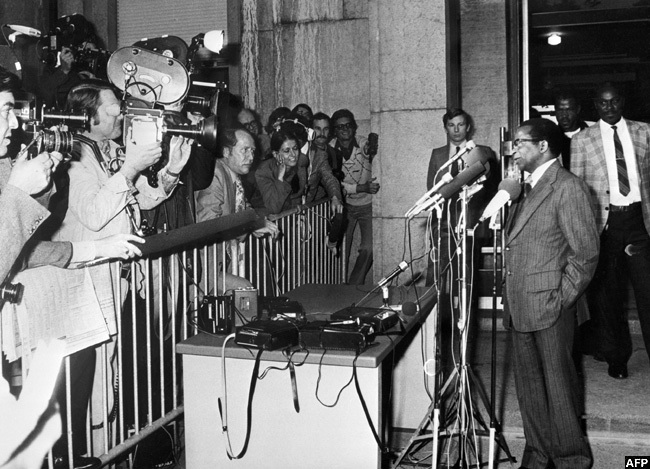 On October 29, 1976, Patriotic Front leader Robert Mugabe gives a press conference in Geneva, Switzerland
On October 29, 1976, Patriotic Front leader Robert Mugabe gives a press conference in Geneva, Switzerland
'Reptilian quality'
"He was a great leader whose leadership degenerated to a level where he really brought Zimbabwe to its knees," said University of South Africa professor Shadrack Gutto.
Britain's former foreign secretary Peter Carrington knew Mugabe well, having mediated the Lancaster House talks that paved the way for Zimbabwe's independence.
"Mugabe wasn't human at all," Carrington told biographer Heidi Holland. "There was a sort of reptilian quality about him.
"You could admire his skills and intellect... but he was an awfully slippery sort of person."
In the final decades of his rule, Mugabe -- one of the world's most recognisable leaders with his thin stripe of moustache and thick-rimmed spectacles -- embraced his new role as the antagonist of the West.
He used blistering rhetoric to blame his country's downward spiral on Western sanctions, though they were targeted personally at Mugabe and his henchmen rather than at Zimbabwe's economy.
"If people say you are dictator... you know they are saying this merely to tarnish and demean your status, then you don't pay much attention," he said in a 2013 documentary.
After decades in which the subject of succession was virtually taboo, a vicious struggle to take over after his death became apparent among the party elite when he reached his 90s and became visibly frail.
He had been rumoured for years to have prostate cancer, but according to the official account, his frequent trips to Singapore were related to his treatment for cataracts.
Mugabe's second wife Grace -- his former secretary who is 41 years his junior and had been seen as a potential successor -- boasted that even in his 80s he would rise before dawn to work out.
"The 89 years don't mean anything," Mugabe said shortly before his last election in 2013.
"They haven't changed me, have they? They haven't withered me. They haven't made me senile yet, no. I still have ideas, ideas that need to be accepted by my people."
But in his later years, he stumbled and fell more than once.
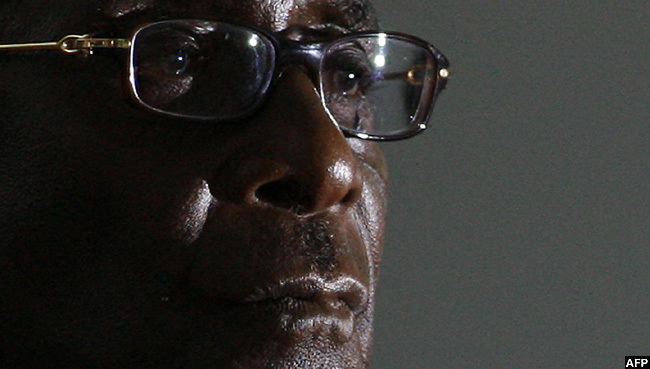
The Catholic Marxist
Born on February 21, 1924 into a Catholic family at Kutama Mission northwest of Harare, Mugabe was described as a loner, and a studious child known to carry a book even while tending cattle in the bush.
After his carpenter father walked out on the family when he was 10, the young Mugabe concentrated on his studies, qualifying as a schoolteacher at the age of 17.
An intellectual who initially embraced Marxism, he enrolled at Fort Hare University in South Africa, meeting many of southern Africa's future black nationalist leaders.
After teaching in Ghana, where he was influenced by founder president Kwame Nkrumah, Mugabe returned to Rhodesia where he was detained for his nationalist activities in 1964 and spent the next 10 years in prison camps or jail.
During his incarceration, he gained three degrees through correspondence, but the years in prison left their mark.
His four-year-old son by his first wife, Ghanaian-born Sally Francesca Hayfron, died while he was behind bars. Rhodesian leader Ian Smith denied him leave to attend the funeral.
He once said that he'd rule his country until he turned 100, and many expected him to die in office.
But as his health weakened, the military finally intervened in late 2017 to ensure that his wife Grace's presidential ambitions were ended in favour of their own preferred candidate.
"His real obsession was not with personal wealth but with power," said biographer Martin Meredith.
"Year after year Mugabe sustained his rule through violence and repression -- crushing political opponents, violating the courts, trampling on property rights, suppressing the independent press and rigging elections."
Mugabe leaves two sons and a daughter by second wife Grace.
__________________________________
ROBERT MUGABE LIFE AS PRESIDENT AT A GLANCE
Take a look at Robert Mugabe's life at the helm . . .
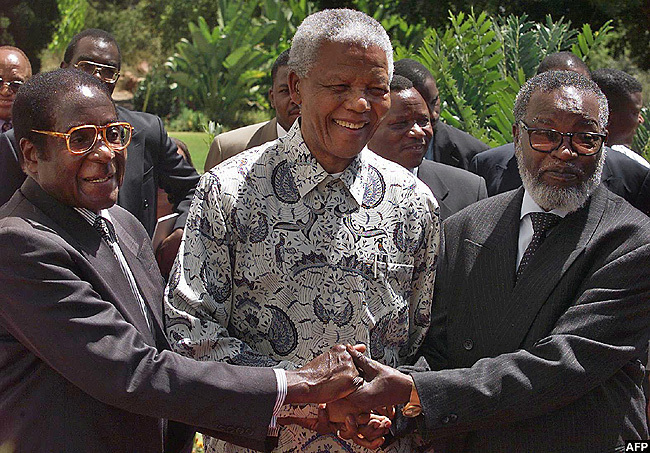 March 5, 1999: South African President Nelson Mandela and his Zimbabwean and Namibian counterparts President Robert Mugabe and Sam Nujoma shake hands after a joint press conference in Pretoria
March 5, 1999: South African President Nelson Mandela and his Zimbabwean and Namibian counterparts President Robert Mugabe and Sam Nujoma shake hands after a joint press conference in Pretoria
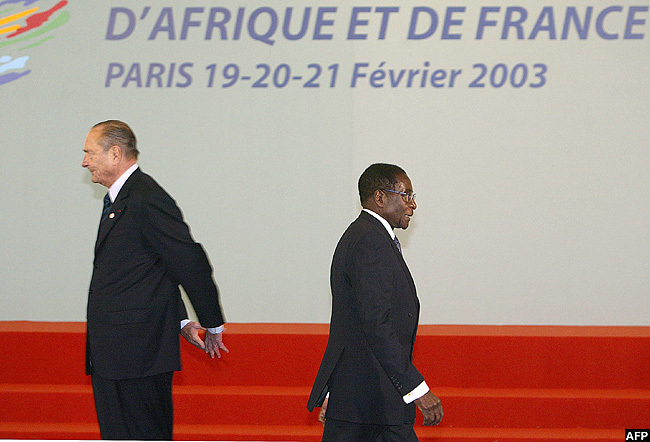 February 20, 2003: French President Jacques Chirac and President Robert Mugabe ahead of the opening of the 22nd Franco-African summit in Paris
February 20, 2003: French President Jacques Chirac and President Robert Mugabe ahead of the opening of the 22nd Franco-African summit in Paris
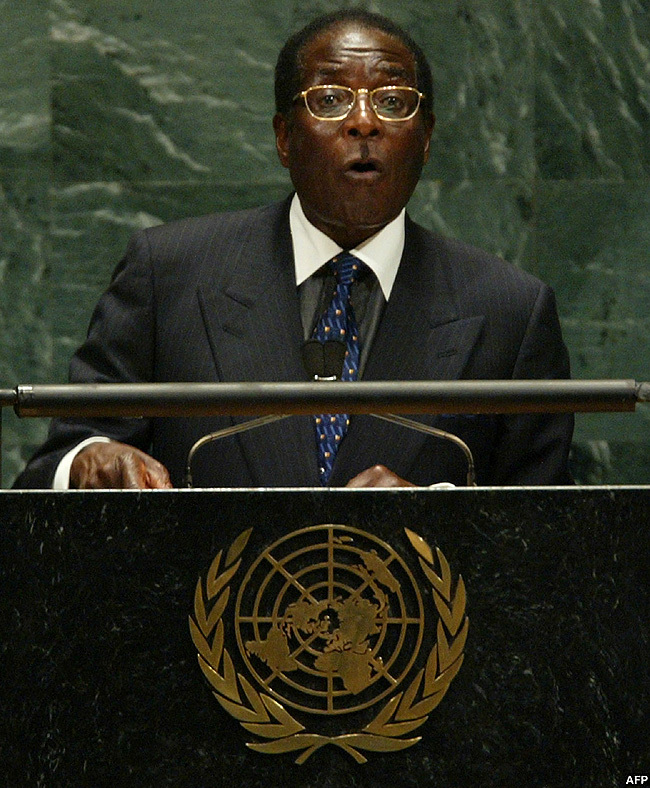 September 26, 2003: President Mugabe speaks during the United Nations General Assembly 58th Session at the United Nations Headquarters in New York
September 26, 2003: President Mugabe speaks during the United Nations General Assembly 58th Session at the United Nations Headquarters in New York
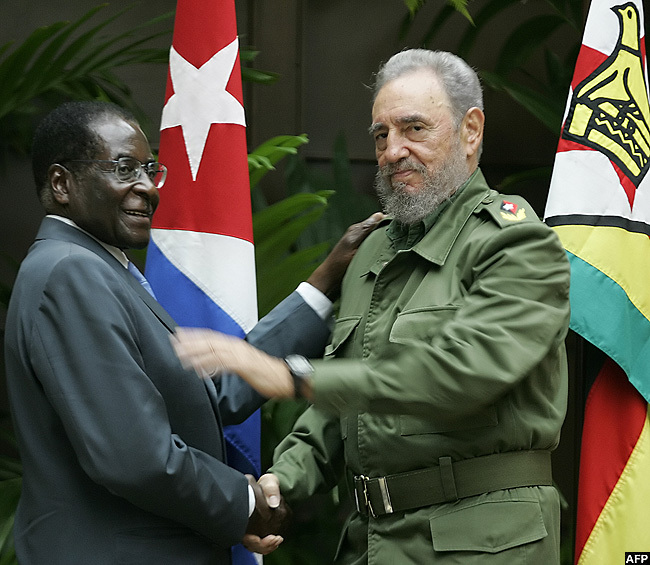 September 12, 2005: Cuban President Fidel Castro shakes hands with Mugabe at the State Council in Havana
September 12, 2005: Cuban President Fidel Castro shakes hands with Mugabe at the State Council in Havana
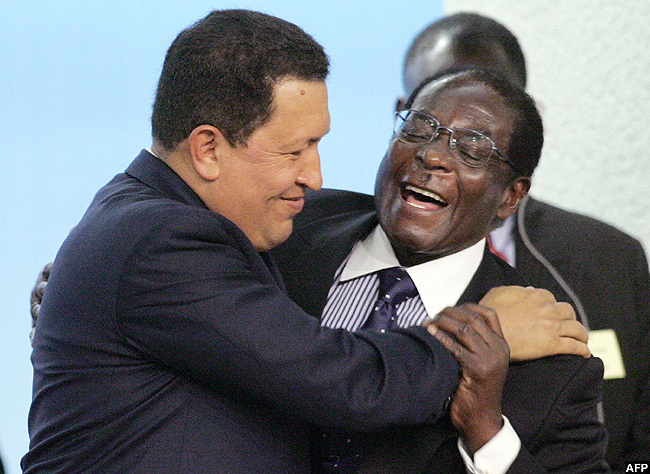 October 17, 2005: Venezuelan President Hugo Chavez hugs his Zimbabwean counterpart after Mugabe's speech during a hunger conference to mark the 60th anniversary of the United Nation's Food and Agriculture
October 17, 2005: Venezuelan President Hugo Chavez hugs his Zimbabwean counterpart after Mugabe's speech during a hunger conference to mark the 60th anniversary of the United Nation's Food and AgricultureOrganisation at Rome's FAO headquarters
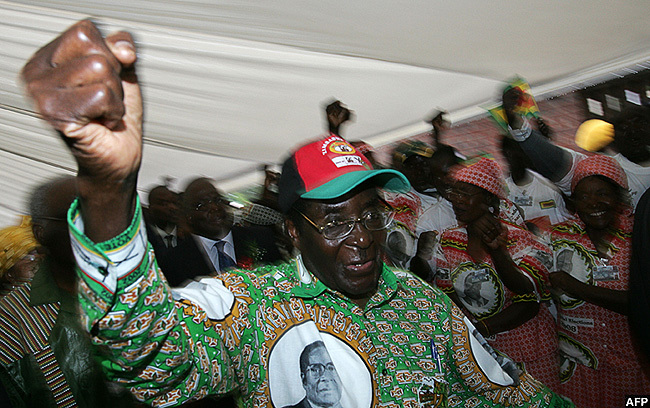 December 13, 2007: Mugabe gestures at a ZANU-PF extraordinary congress in Harare
December 13, 2007: Mugabe gestures at a ZANU-PF extraordinary congress in Harare
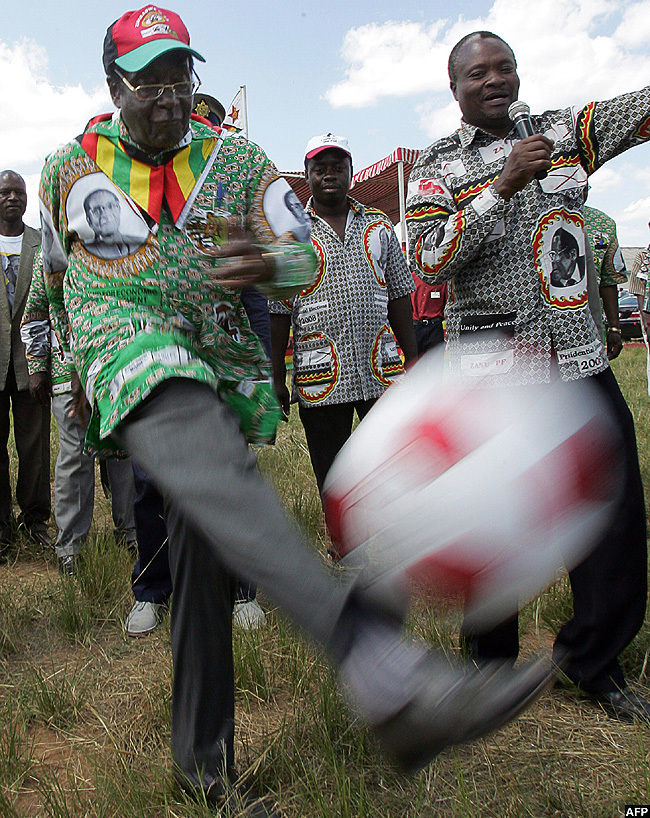 March 28, 2008: President Mugabe and leader of Zimbabwe's ruling party ZANU-PF kicks a ball during a campaign rally in Harare
March 28, 2008: President Mugabe and leader of Zimbabwe's ruling party ZANU-PF kicks a ball during a campaign rally in Harare
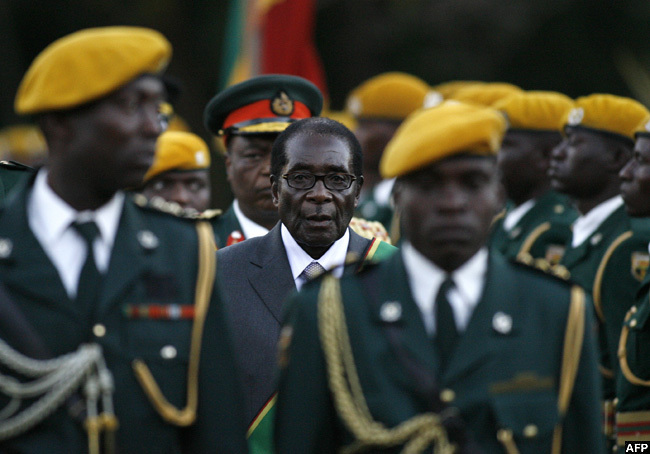 June 30, 2008: President Robert Mugabe is hastily sworn in for a sixth term in office in Harare after being declared the winner of the election
June 30, 2008: President Robert Mugabe is hastily sworn in for a sixth term in office in Harare after being declared the winner of the election
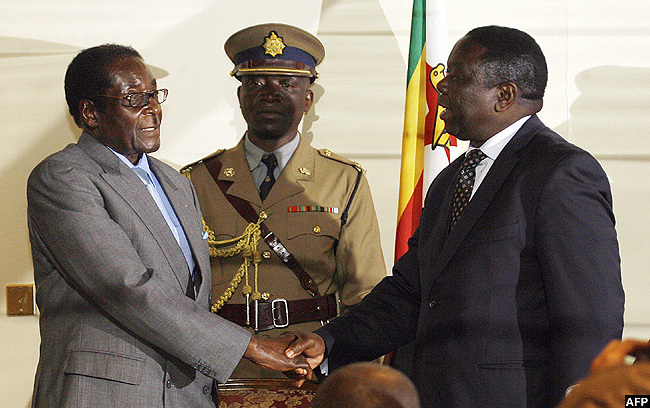 July 21, 2008: Zimbabwean President Robert Mugabe shakes hands with Movement for Democratic Change leader Morgan Tsvangirai in Harare after the signing of a deal between Zimbabwe's opposition and ruling party, paving the way for full-scale talks
July 21, 2008: Zimbabwean President Robert Mugabe shakes hands with Movement for Democratic Change leader Morgan Tsvangirai in Harare after the signing of a deal between Zimbabwe's opposition and ruling party, paving the way for full-scale talks
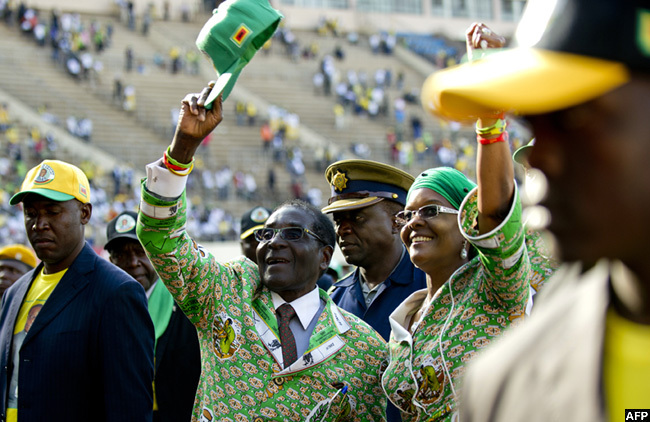 July 28, 2013: President Mugabe greets his supporters alongside his wife Grace after his address at a rally in Harare
July 28, 2013: President Mugabe greets his supporters alongside his wife Grace after his address at a rally in Harare
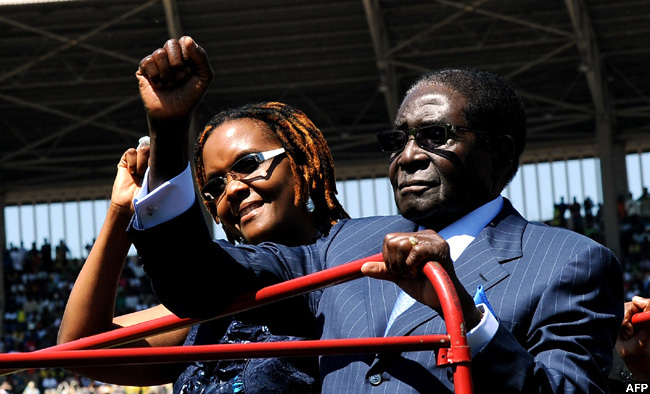 August 22, 2013: Accompanied by wife Grace, Mugabe raises his fist as he greets the crowd at his inauguration ceremony in Harare at the National 60,000-seat sports stadium
August 22, 2013: Accompanied by wife Grace, Mugabe raises his fist as he greets the crowd at his inauguration ceremony in Harare at the National 60,000-seat sports stadium
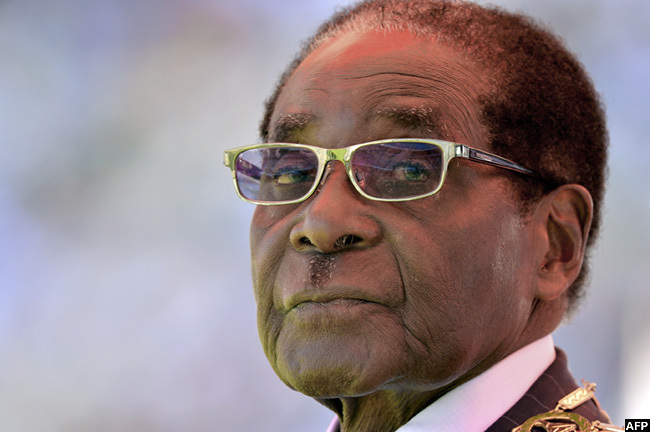 August 22, 2013: President Mugabe looks on during his inauguration and swearing-in ceremony at the 60,000-seater sports stadium in Harare
August 22, 2013: President Mugabe looks on during his inauguration and swearing-in ceremony at the 60,000-seater sports stadium in Harare
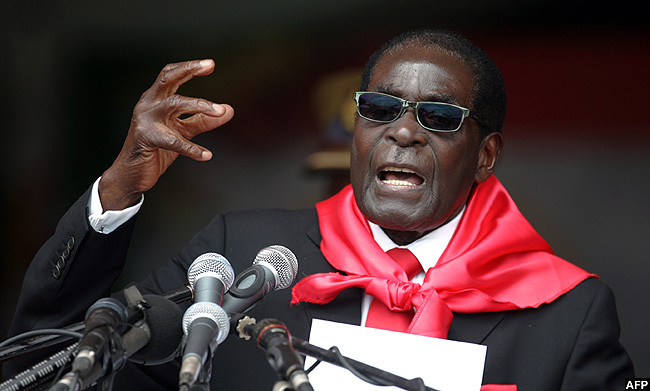 February 23, 2014: Mugabe talks during celebrations marking his 90th birthday in Marondera
February 23, 2014: Mugabe talks during celebrations marking his 90th birthday in Marondera
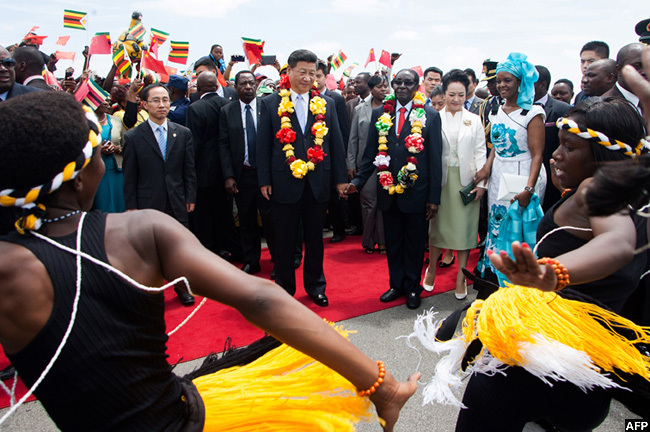 December 1, 2015: Chinese President Xi Jinping watches traditional dancers performing and holds hands with his Zimbabwean coupart Mugabe as he arrives for a visit in Harare
December 1, 2015: Chinese President Xi Jinping watches traditional dancers performing and holds hands with his Zimbabwean coupart Mugabe as he arrives for a visit in Harare
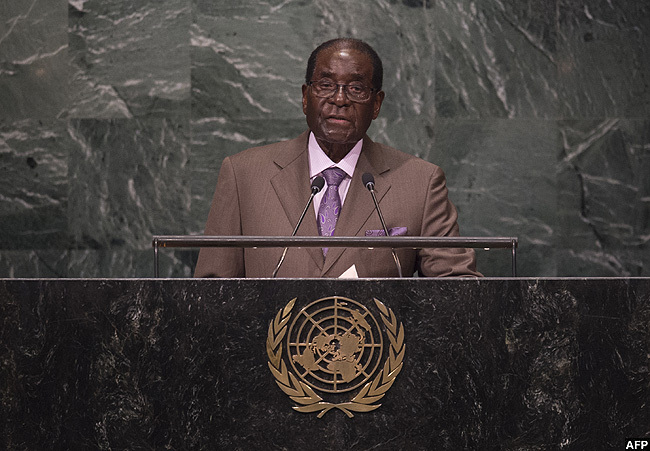 September 21, 2016: Robert Mugabe waits to address the United Nations General Assembly General Debate at the United Nations in New York
September 21, 2016: Robert Mugabe waits to address the United Nations General Assembly General Debate at the United Nations in New York
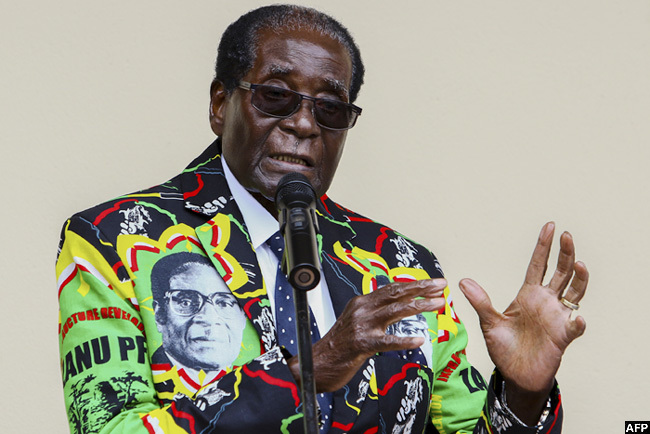 December 17, 2016: Mugabe speaks at the party's annual conference in Masvingo
December 17, 2016: Mugabe speaks at the party's annual conference in Masvingo
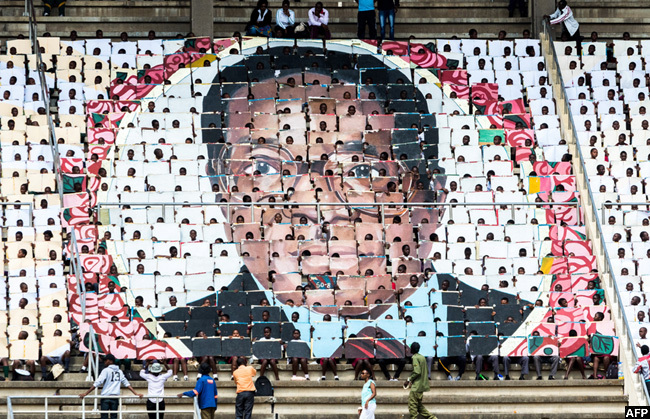 April 18, 2017: School children hold an image of President Mugabe during the country's 37th Independence Day celebrations at the National Sports Stadium in Harare
April 18, 2017: School children hold an image of President Mugabe during the country's 37th Independence Day celebrations at the National Sports Stadium in Harare
 August 14, 2017: Mugabe inspects a guard of honour during official Heroes Day commemorations held at National Heroes Acre in Zimbabwe
August 14, 2017: Mugabe inspects a guard of honour during official Heroes Day commemorations held at National Heroes Acre in Zimbabwe
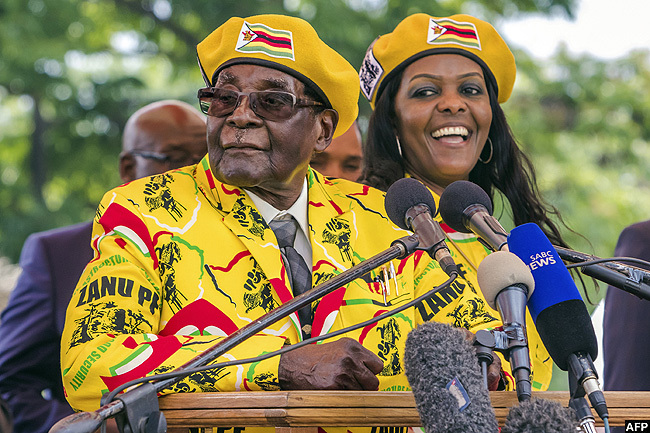 November 8, 2017: Mugabe addresses party members and supporters gathered at his party headquarters to show support to Grace Mugabe (right) becoming the party's next Vice President after the dismissal of future president Emerson Mnangagwa
November 8, 2017: Mugabe addresses party members and supporters gathered at his party headquarters to show support to Grace Mugabe (right) becoming the party's next Vice President after the dismissal of future president Emerson Mnangagwa
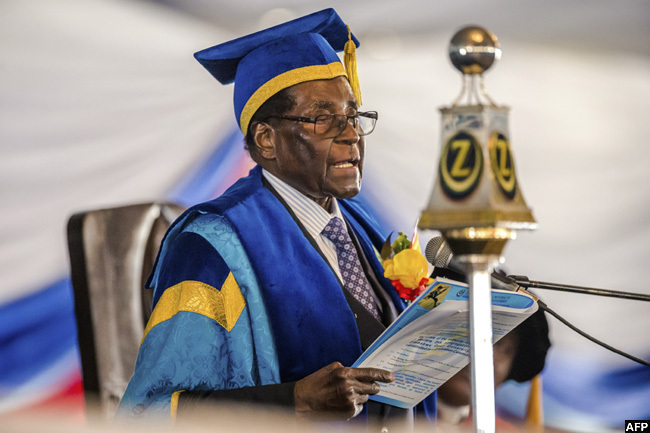 November 17, 2017: Mugabe delivers a speech during a graduation ceremony at the Zimbabwe Open University in Harare, where he presides as the Chancellor
November 17, 2017: Mugabe delivers a speech during a graduation ceremony at the Zimbabwe Open University in Harare, where he presides as the Chancellor
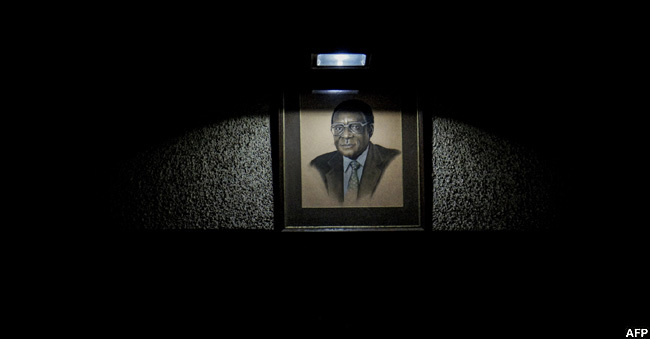 November 19, 2017: A portrait of President Mugabe hangs in the ZANU-PF hall where delegates are sitting for a special ZANU-PF party Central Committee at the party's headquarters in Harare
November 19, 2017: A portrait of President Mugabe hangs in the ZANU-PF hall where delegates are sitting for a special ZANU-PF party Central Committee at the party's headquarters in Harare
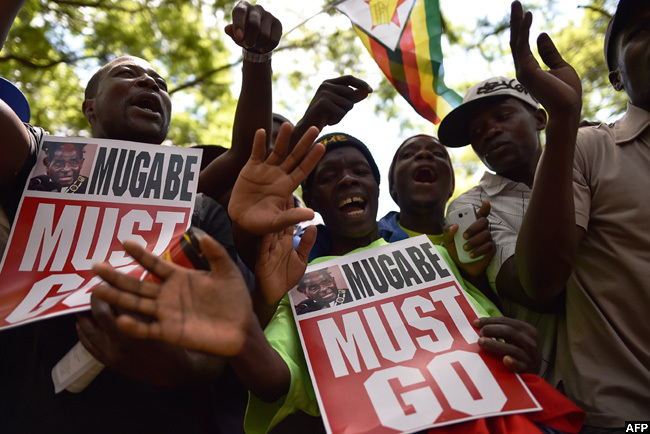 November 21, 2017: Anti-Mugabe protesters hold placards during a gathering at Unity square in the capital Harare
November 21, 2017: Anti-Mugabe protesters hold placards during a gathering at Unity square in the capital Harare
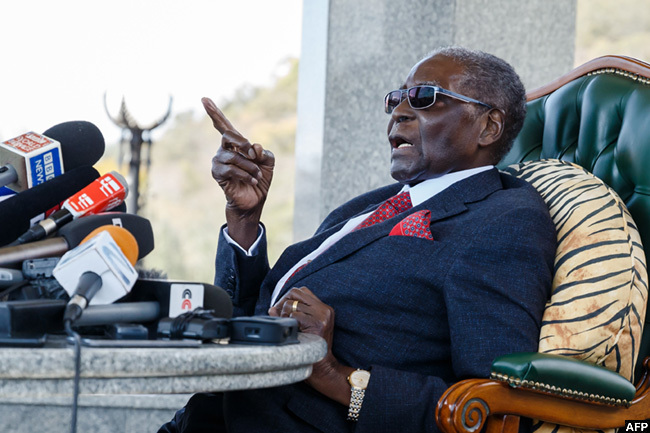 July 29, 2018: President Mugabe addresses the media during a surprise press conference at his residence "Blue Roof " in Harare, on the eve of the country's first election since he was ousted from office last year
July 29, 2018: President Mugabe addresses the media during a surprise press conference at his residence "Blue Roof " in Harare, on the eve of the country's first election since he was ousted from office last year
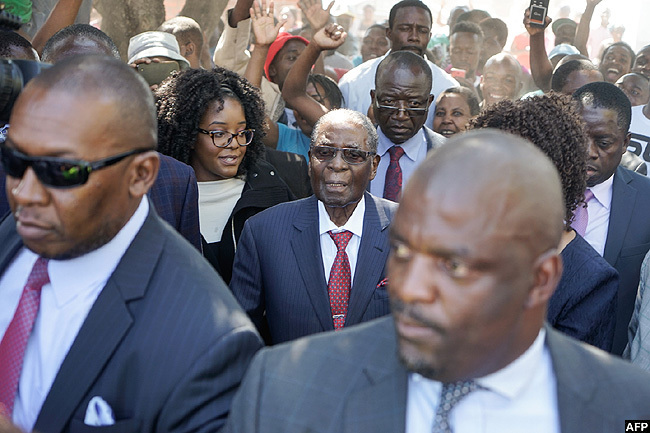 July 30, 2018: Former president Mugabe arrives outside the polling station at a primary school in the Highfield district of Harare, where he will vote in the general elections
July 30, 2018: Former president Mugabe arrives outside the polling station at a primary school in the Highfield district of Harare, where he will vote in the general elections